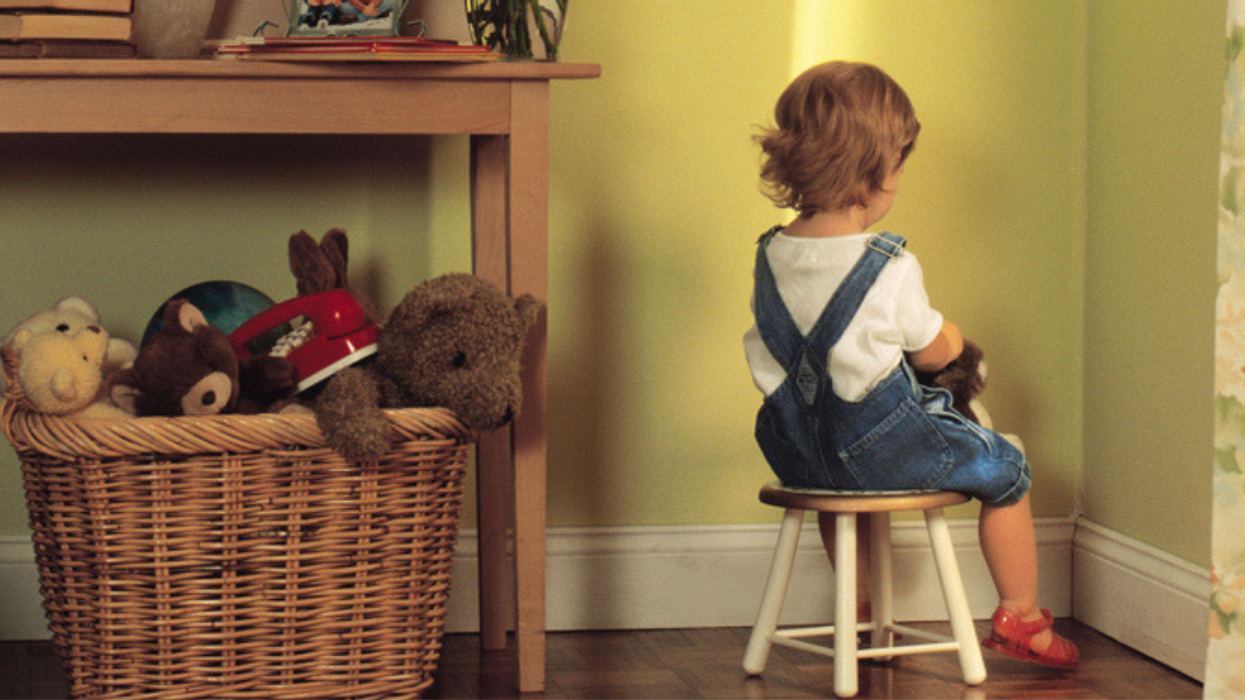One mom blogger challenged parents to look at the way they punish their kids.
Now it's sparked a debate
Mom blogger, Laura Muhl, wrote a post that suggests parents look at the way they handle toddlers and punishment. Most kids have been put in a corner for misbehaving, but Muhl challenged that idea.
Timeout is used for any infraction from whining over nothing to throwing things or hitting others. And Muhl claimed timeout leads to long term issues for children.
Muhl started her post with a quote from L.R Knost's book The Gentle Parent:
"Perhaps the reason teens isolate themselves when they're overwhelmed instead of coming to us with their problems is because when they're toddlers we isolate them when they're overwhelmed instead of helping them with their problems."
These words spoke to Muhl when she read the book. It sparked something in her that she felt needed to be shared.
Muhl added her own take on it:
"When our kids are small and trying to manage emotions, they can't express what they are feeling. They throw tantrums, they throw things, they have meltdowns, they scream and they whine. This is their way of communicating with us."
Muhl went on to suggest that this isolation is teaching children to suppress their feelings. According to Muhl's interpretation of Knost's work, this causes children to pull away from their parents when they are teens because they have been taught to suppress their emotions.
Muhl said:
"Give your child permission to feel. Let them know their feelings are valid and that you care, no matter how small. Make sure they know that they are heard."
"Pretty soon meltdowns over crayons will turn into breakups, heartbreak, sex, or even depression. You want your child to know that you will always hear them, no matter how small. You are their safe space."
Parents weighed in on both sides of the argument.
The post quickly racked up a whopping 4000 comments both for and against timeouts. Those who agreed with Muhl liked the idea of a steady and balanced approach to dealing with toddlers and their tantrums.
Other parents stood on the "Hard No" side of the line. Citing lack of discipline in today's youth, they blamed isolation in teens on cellphones and social media.
There were also those parents who use timeouts to pull their children out of the situation.
This gives the child a chance to calm down and step out of the situation. After the child calms down, it gives the parents and child a chance to talk over what caused the problem in the first place.
Child Behaviour Research Clinic at University of Sydney in Australia recently did a study in regards to timeouts. The study showed that children are happier when given timeouts.
It also showed that timeouts are still the most effective form of punishments for the very young child.
Professor Mark Dadds, based at the University's Brain and Mind Centre, stated:
"In 30 years, we've treated thousands of kids with disruptive behavior. When we use time-out as part of a positive parenting program, kids are much happier and much more regulated."
This study, and other smaller ones, have shown the same thing. Timeouts are more effective than physical forms of punishment.
After the comments, whether for or against, started pouring in, Muhl stated:
"A lot of people misunderstood my words and interpreted it as me saying to never discipline your child. This is totally not the case. As an adult, when something stressful happens, I don't want to be sent off to cry it out. Being left to cry it out is being told that they shouldn't have those feelings in the first place."
She continued with:
"Everything we do shapes their emotional brain for the rest of their lives. Being mindful of our own actions and the effects we have on our child is so important ... [as is] making sure that your child knows that they are loved and heard and capable of making better choices going forward."
Time out chairs grace Pintrest boards and Facebook marketplaces.
As kids, many of us sat in chairs in corners while waiting for our parents to let us up. Emotions are better conveyed if a person can pull themselves from a situation and calm down before talking things over.
But the generation before us were spanked. The generation before them went to the woodshed with a belt or a switch.
Discipline evolves over time.
ChildMind.org explains it best.
"That means a lot of affection and positive feedback for kids, but also consistent consequences when they act inappropriately. Timeouts help you communicate that behavior is unacceptable without blowing your top."








 Roberto Schmidt/AFP via Getty Images
Roberto Schmidt/AFP via Getty Images





 u/pizzaratsfriend/Reddit
u/pizzaratsfriend/Reddit u/Flat_Valuable650/Reddit
u/Flat_Valuable650/Reddit u/ReadyCauliflower8/Reddit
u/ReadyCauliflower8/Reddit u/RealBettyWhite69/Reddit
u/RealBettyWhite69/Reddit u/invisibleshadowalker/Reddit
u/invisibleshadowalker/Reddit u/Wishnik6502/Reddit
u/Wishnik6502/Reddit u/kateastrophic/Reddit
u/kateastrophic/Reddit u/blking/Reddit
u/blking/Reddit u/SlagQueen/Reddit
u/SlagQueen/Reddit u/geezeslice333/Reddit
u/geezeslice333/Reddit u/meertaoxo/Reddit
u/meertaoxo/Reddit u/crystal_clear24/Reddit
u/crystal_clear24/Reddit u/stinkpot_jamjar/Reddit
u/stinkpot_jamjar/Reddit
 u/Bulgingpants/Reddit
u/Bulgingpants/Reddit
 @hackedliving/TikTok
@hackedliving/TikTok @hackedliving/TikTok
@hackedliving/TikTok @hackedliving/TikTok
@hackedliving/TikTok @hackedliving/TikTok
@hackedliving/TikTok @hackedliving/TikTok
@hackedliving/TikTok @hackedliving/TikTok
@hackedliving/TikTok @hackedliving/TikTok
@hackedliving/TikTok @hackedliving/TikTok
@hackedliving/TikTok @hackedliving/TikTok
@hackedliving/TikTok @hackedliving/TikTok
@hackedliving/TikTok
 @vanderjames/Instagram
@vanderjames/Instagram @vanderjames/Instagram
@vanderjames/Instagram @vanderjames/Instagram
@vanderjames/Instagram @vanderjames/Instagram
@vanderjames/Instagram @vanderjames/Instagram
@vanderjames/Instagram @vanderjames/Instagram
@vanderjames/Instagram @vanderjames/Instagram
@vanderjames/Instagram @vanderjames/Instagram
@vanderjames/Instagram @vanderjames/Instagram
@vanderjames/Instagram @vanderjames/Instagram
@vanderjames/Instagram